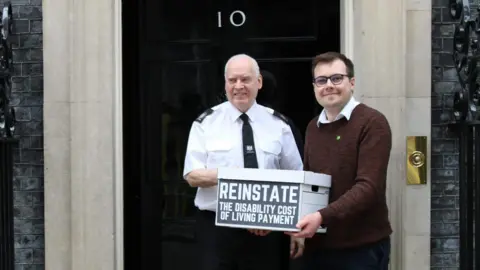'Teachers should have to take neurodiversity training'
 Supplied
SuppliedAn autistic man wants all teachers to undertake training to help them better understand how to interact with neurodivergent students and employees.
Tom Howard's petition, calling on the government to make the training mandatory, already has more than 10,000 supporters.
The 29-year-old, from Bury St Edmunds, Suffolk, hoped it would help make education more accessible, improve inclusion and safety, and ensure the mental health of neurodivergent students does not suffer like his did.
"At university, things became overwhelming, the lack of understanding and reasonable adjustments pushed me to breaking point," he told the BBC.
 Supplied
SuppliedAccording to the national charity Children's Society UK, it was estimated that between 15 and 20% of young people in the UK were neurodivergent.
This meant they had been diagnosed with either autism, ADHD, dyslexia, dyscalculia, dyspraxia, dysgraphia or Tourette's Syndrome, NHS England said.
Research by the National Autistic Society, meanwhile, showed just 14% of secondary school teachers have received more than half a day's training on autism.
Its education report also revealed that 70% of autistic young people said teachers don't understand enough about autism.
Joey Nettleton Burrows, policy and public affairs manager at the organisation, said it was "critical" for teachers to understand autism to ensure autistic pupils feel supported in the classroom.
"A lack of understanding about autism can lead to students feeling unsupported, or that their needs aren't being met, which can have a negative impact on their attendance and attainment," he said.
"Autistic children deserve the right help at school, and teachers should be supported to provide this.
"All teachers and school staff should receive mandatory autism training to improve understanding and ensure that all autistic children get the education they need."
 Getty Images
Getty ImagesMr Howard said he feared struggles faced by neurodivergent students could contribute to "poor mental health and emotional distress" – something he wants to prevent from happening.
"I want teachers to have training so they can spot and understand the signs and symptoms and learn how to interact with people who are neurodivergent," he said.
"But it's not just about the interactions between teachers and students because there are more and more neurodivergent teachers and support staff in the workplace."
'Every student deserves to be understood'
Mr Howard received a "late diagnosis" for his autism in July 2016 when he was 20 years old and studying at university.
The lack of quiet spaces for breaks, clear instructions, extended time for exams and coursework, flexible deadlines and the availability of assistive technology made studying difficult, he said.
He also struggled with changing timetables, not being allowed to leave class when he felt overwhelmed, and not having one-to-one mentoring sessions with a trusted staff member.
"This lived experience is what now drives me to campaign for change because no one should have to reach crisis before they're supported," he said.
"Every teacher deserves the tools to recognise and respond to neurodivergence—and every student deserves to be understood."
'Something will change'
Mr Howard surveyed just over 80 teachers and lecturers as part of research for his campaign and said he was "quite surprised" when 90% told him neurodivergent training would be useful.
Speaking about the petition, he said: "It is absolutely incredible, I have been overwhelmed by the public response, and I am looking forward to seeing what the government has to say.
"If I can get further cross-party backing and keep raising awareness, I think we will slowly chip away at it, and I am hopeful something will change."
The government is required to respond to petitions on the UK Parliament website with more than 10,000 signatures.
A Department for Education spokesperson said: "It will take time but, as part of our Plan for Change, we are thinking differently about what the Send [special educational needs and disabilities] system should look like, to restore the confidence of families up and down the country and deliver the improvement they are crying out for so every child can achieve and thrive.
"We are already making progress by investing £1bn into Send nationally and £740m to encourage councils to create more specialist places in mainstream schools, paving the way for significant, long-term reform."
Follow Suffolk news on BBC Sounds, Facebook, Instagram and X.
